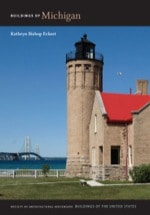Harbor Point is the most exclusive of the eight summer resorts, some divided into as many as two hundred lots, that were established in the Harbor Springs vicinity by 1910. It was organized in 1878 by a group of Lansing businessmen who had camped out at Harbor Point. They formed a stock company, sold shares to nineteen members, and purchased the fifty-two-acre point of land from Father Wiecamp, a Franciscan monk of Cross Village. The grounds were laid out “for the leasing and occupancy of lots by members, together with the use of the surrounding grounds by them, under regulations of the association, and without streets, alleys, or other grounds usually open to the public.” To maintain control over the resort's future, the association's board of directors retained title to the land. After receiving approval from the board, a member could purchase a $100 share of stock, which entitled him or her to select a lot on which to build a house costing not less than $100.
Initially the underbrush was cleared, walks and drives were put in, and a hotel, dock and boathouse, and bathhouse were built. Five years later, in 1883, some thirty new cottages were built. The earliest of these were modest Stick Style wooden structures built by local craftsmen for as little as $250. The cottages of the 1890s, however, offered more extensive, modern, and convenient accommodations. In 1900 at Harbor Point, a “splendid cottage” with fourteen rooms and modern conveniences could be built for $4,000. Some were designed by architects from the home cities of the summer visitors. Thirty were designed or altered by Earl H. Mead, who generally designed rectangular-shaped buildings with steeply pitched roofs with generous overhangs. He covered wooden frames with clapboard and shingle siding, applied classical details, and planned open interior spaces.
By 1899 Harbor Point had turned into an exclusive upper-class resort, with families from all over the Midwest occupying its eighty cottages and enjoying the casino. Residents of Harbor Point have included bankers, railroad employees, justices, manufacturers, Detroit lumberman David Whitney, Chicago chewing gum magnate William Wrigley Jr., Cincinnati soap manufacturer David Gamble, and Chicago Great Lakes transit company owner Albert W. Goodrich. Harbor Point is a midwestern variant of Newport, Rhode Island.
Access off the southeast corner of Glen Drive and Traverse Street to the entrance of Harbor Point is restricted to members and guests, and no cars are allowed. Most cottages on the point may be viewed by boat, however.
Writing Credits
If SAH Archipedia has been useful to you, please consider supporting it.
SAH Archipedia tells the story of the United States through its buildings, landscapes, and cities. This freely available resource empowers the public with authoritative knowledge that deepens their understanding and appreciation of the built environment. But the Society of Architectural Historians, which created SAH Archipedia with University of Virginia Press, needs your support to maintain the high-caliber research, writing, photography, cartography, editing, design, and programming that make SAH Archipedia a trusted online resource available to all who value the history of place, heritage tourism, and learning.

